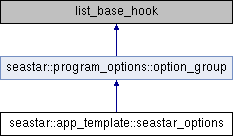Detailed Description
Seastar configuration options.
#include <seastar/core/app-template.hh>

Public Types | |
| using | value_list_type = boost::intrusive::list< basic_value, boost::intrusive::base_hook< list_base_hook >, boost::intrusive::constant_time_size< false > > |
| using | option_group_list_type = boost::intrusive::list< option_group, boost::intrusive::base_hook< list_base_hook >, boost::intrusive::constant_time_size< false > > |
Public Member Functions | |
| operator bool () const | |
| Does the option group has any values contained in it? | |
| bool | used () const |
| const std::string & | name () const |
| const value_list_type & | values () const |
| value_list_type & | values () |
| void | describe (options_descriptor &descriptor) const |
| void | mutate (options_mutator &mutator) |
Public Attributes | |
| sstring | name = "App" |
| sstring | description = "" |
| bool | auto_handle_sigint_sigterm = true |
| Handle SIGINT/SIGTERM by calling reactor::stop() More... | |
| reactor_options | reactor_opts |
| Configuration options for the reactor. | |
| metrics::options | metrics_opts |
| Configuration for the metrics sub-system. | |
| smp_options | smp_opts |
| Configuration options for the smp aspect of seastar. | |
| scollectd::options | scollectd_opts |
| Configuration for the scollectd sub-system. | |
| log_cli::options | log_opts |
| Configuration for the logging sub-system. | |
Member Function Documentation
◆ describe()
|
inherited |
Describe the content of this option group to the visitor.
The content is visited in a depth-first manner:
- First the option groups itself is visited with options_descriptor::visit_group_start(). If this returns
falsethe entire content of the group, including all its subgroups and values are skipped and options_descriptor::visit_group_end() is called immediately. Otherwise visiting the content of the group proceeds. - All the values contained therein are visited. For each value the following happens:
- First options_descriptor::visit_value_metadata() is called with generic metadata that all values have. If this return
falsethe value is skipped, otherwise visiting the value proceeds. - Then the appropriate overload of options_descriptor::visit_value() is called, with a pointer to the default value of the respective value. The pointer is null if there is no default value.
- For selection_value, options_descriptor::visit_selection_value() will be called instead of options_descriptor::visit_value(). After the value is visited, the option_group instance belonging to each candidate (if set) will be visited.
- First options_descriptor::visit_value_metadata() is called with generic metadata that all values have. If this return
- All the nested option_group instances in the current group are visited.
- Finally options_descriptor::visit_group_end() is called.
◆ mutate()
|
inherited |
Mutate the content of this option group by the visitor.
The visiting algorithm is identical to that of describe(), with the following differences:
- options_mutator::visit_value() is allowed to mutate the value through the passed-in reference. It should return
trueif it did so andfalseotherwise. - When visiting a selection value, only the nested group belonging to the selected value is visited afterwards.
Member Data Documentation
◆ auto_handle_sigint_sigterm
| bool seastar::app_template::seastar_options::auto_handle_sigint_sigterm = true |
Handle SIGINT/SIGTERM by calling reactor::stop()
When true, Seastar will set up signal handlers for SIGINT/SIGTERM that call reactor::stop(). The reactor will then execute callbacks installed by reactor::at_exit().
When false, Seastar will not set up signal handlers for SIGINT/SIGTERM automatically. The default behavior (terminate the program) will be kept. You can adjust the behavior of SIGINT/SIGTERM by installing signal handlers via reactor::handle_signal().
◆ description
| sstring seastar::app_template::seastar_options::description = "" |
The description of the application.
Will be printed on the top of the –help output. Lines should be hard-wrapped for 80 chars.
◆ name
| sstring seastar::app_template::seastar_options::name = "App" |
The name of the application.
Will be used in the –help output to distinguish command line args registered by the application, as opposed to those registered by seastar and its subsystems.
The documentation for this struct was generated from the following file:
- seastar/core/app-template.hh